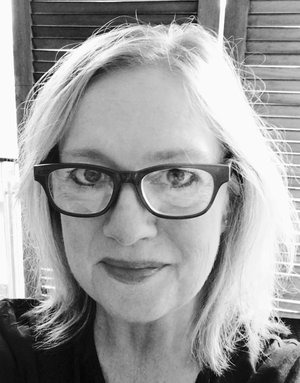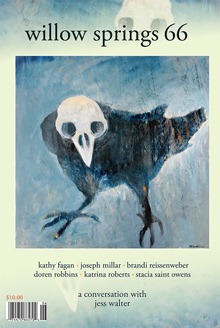
About Kathy Fagan
Kathy Fagan’s newest collection is Lip (Eastern Washington UP, 2009). She is also the author of the National Poetry Series selection The Raft (Dutton, 1985), the Vassar Miller Prize winner MOVING & ST RAGE (Univ of North Texas, 1999), and The Charm (Zoo, 2002). Her poems have appeared in The Paris Review, The Kenyon Review, Slate, Field, Ploughshares, The New Republic, and The Missouri Review, among other literary magazines, and her nonfiction, in River Teeth. Fagan is the recipient of awards and fellowships from the Ingram Merrill Foundation, the National Endowment for the Arts, Ohioana, and the Ohio Arts Council. Formerly the Director of Creative Writing and the MFA Program at The Ohio State University, she is currently Professor of English and Editor of The Journal.
A Profile of the Author
Notes on “Self-Portrait as Sycamore in Copper & Pearl”
“Self-Portrait as Sycamore in Copper & Pearl” is one poem—one of the longest poems so far— in a new book-length manuscript, tentatively titled Sycamore. For over a year I’ve been researching and observing these trees, and I realized that I’d referenced them in previous books, sometimes misidentifying them, often not naming them directly. Clearly they’d been working at the periphery of my vision, vision meaning eyesight and foresight in this case, and I wanted to figure out what that could mean. The notion of self-portrait also, though somewhat trendy at the moment, helped me to bridge my natural persona-writing tendencies with something that felt more authentically autobiographical—except, of course, in this case, the self-portrait is presented as a tree. That imposed distance allows me to draw on elements of culture and history
that a single human lyrical speaker might not be capable of. The trees’ cultural ubiquitousness,
their longevity and silence, their vulnerability and enormity, their invisibility, adaptability, and
usefulness—all of that feels right now very close to me, and “other” enough to hold my interest.
In my 2009 collection, Lip, various personae speak—angrily, flippantly, loudly, bitterly—they
talk A LOT. It’s a talky book. The project of Sycamore is more about listening: like holding a
stethoscope up to the air.
My challenge, in all of these poems, is structure and scope. I won’t discuss scope here, but as for
structure, “Self-Portrait as Sycamore in Copper & Pearl” required a visually and syntactically expansive, branch-like stanza. I had to let enough light in and around the lines for the trees’
many colors to shine, but I also had to focus the eye—via the short lines—on less pastoral
images. Spiritually I think the poem has an ancestor in Frost’s “Directive,” in the sense that both
poems insist on acknowledging the flawed and moribund within an idyllic setting. Both “guides”
have only at interest our getting lost.
Notes on Reading
I’m sure I could think of at least three underrated books, but in the interest of not leaving anyone out let me just say that I recommend Christopher Howell’s Light’s Ladder to my friends and students and they devour it. I myself return to it again and again. I am also re-reading Lorca, Didion, Stevens, and Dickinson. I’m reading, for the first time, Ron Silliman’s The New Sentence and Francine Prose’s Goldengrove.
My major early influences were Poe, Yeats, Dylan Thomas, Sylvia Plath, and Philip Levine. I’m old enough to read them all again now and to love them freshly, and I realize I had awfully good taste as a child. I can’t write without words and pictures around. Dictionaries, field guides, poems, exhibit pamphlets. I have a picture file with literally hundreds of photos of sycamores at various times of the day in all seasons and locales. Word breeds word. Image begets image. I’m always striving to write a poem, but to think poetically—openly and expansively and minutely and emotionally and architecturally and musically all at once—that’s the exquisitest part.


